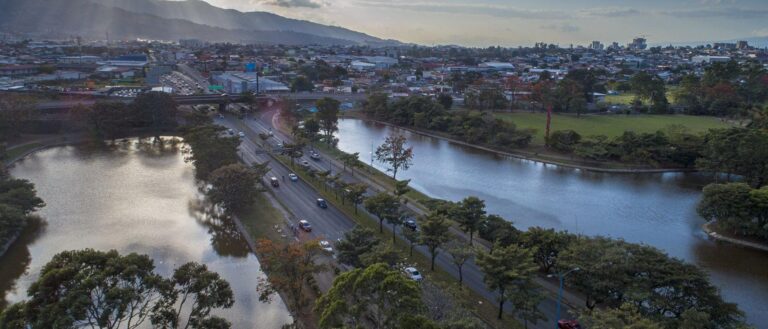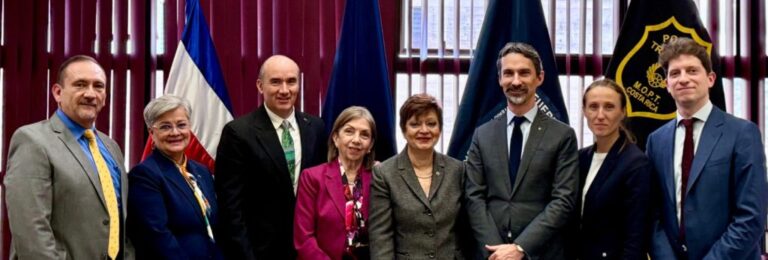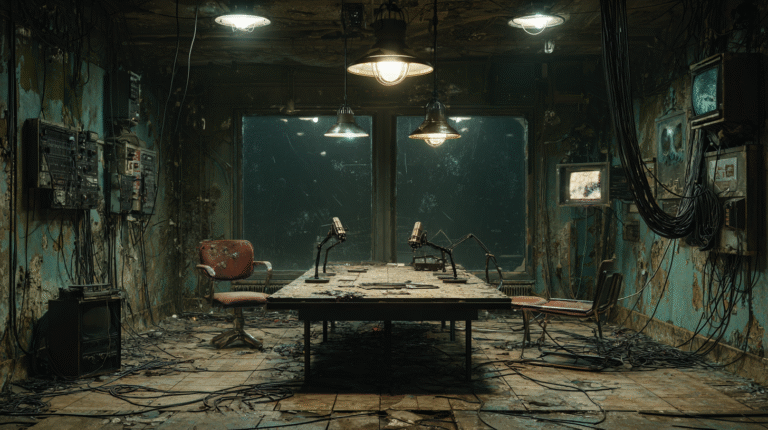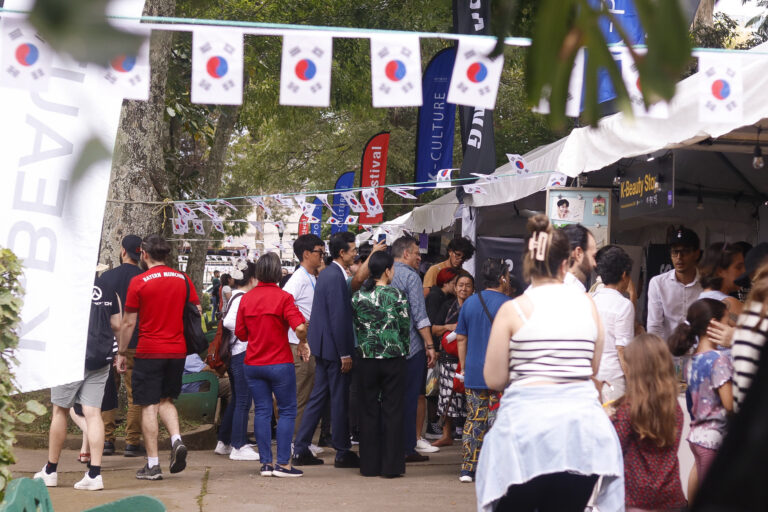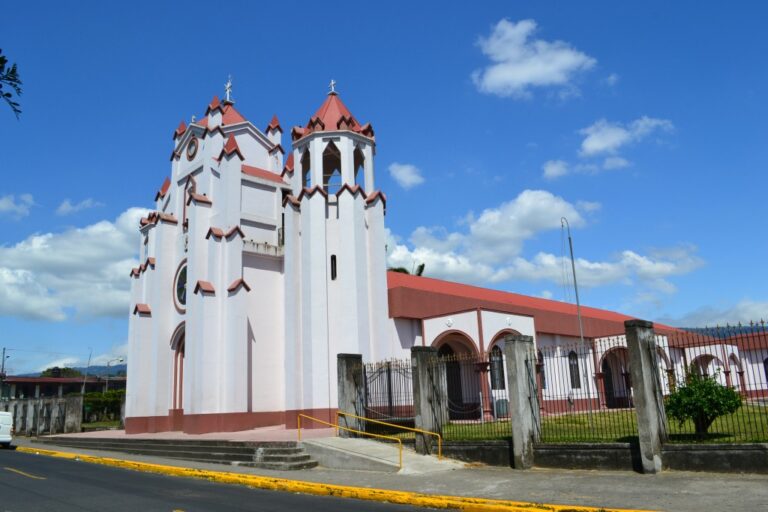Lorenzo Salazar Morales, affectionately known as “Lencho Salazar,” was more than just a musician; he was a symbol of Costa Rican folklore and a beloved figure for his unique ability to capture the spirit of the people through music. Born on December 4, 1931, in San Roque de Naranjo, Alajuela, Lencho began his musical journey at an early age, driven by the passion instilled in him by his mother. Throughout his life, he became a fervent defender of Costa Rican popular culture, bringing legends and traditions to life through his humorous songs and his talent as a multi-instrumentalist.
This article serves as a tribute to the memory and career of this exceptional man, whose legacy has left an indelible mark on the cultural history of Costa Rica. Lencho Salazar not only gave us his art and his humor but also stood as a guardian of our traditions, uniting generations with his music and his unwavering love for Costa Rican identity. Today we remember and celebrate his life and work, grateful for having shared his talent with the world and for having enriched our country with his art.


Early Years
Lorenzo Salazar Morales, “Lencho Salazar,” was born into a humble family in San Roque de Naranjo, Alajuela, on December 4, 1931.
From a very young age, Lencho showed a natural inclination towards music, encouraged by his mother, Elisa Morales Corrales, who was a crucial figure in his artistic development.
At the age of five, he began playing the guitar, demonstrating an innate talent that would accompany him throughout his life. The rural environment and the traditions of his community deeply influenced his formation as a musician and composer.
Lencho was inspired by the stories, legends, and folklore of Costa Rica, which he would later capture in his songs. This early exposure to the popular culture of Costa Rica forged his unique style, which combined humor and social criticism, always with a touch of authenticity and love for his roots.
His passion for music led him to join the Trío Costa Rica in 1953, marking the beginning of a career that, although it started in his small town, would soon catapult him to become a key figure in the folk music of Costa Rica. From the beginning, Lencho was more than a musician: he was a chronicler of his time, a storyteller of the everyday stories of the Costa Rican people, capturing their essence and their emotions through melodies and lyrics that resonated with everyone.
This formative stage of his life not only defined his style and his career but also laid the foundation for his legacy as one of the most prominent exponents of Costa Rican humorous folk songs, a task that he continued to perfect until his last days.
Musical Career

Lencho Salazar officially began his musical career in 1953 when he joined Paulino and Miguel Porras Hidalgo to form the Trío Costa Rica in the city of San Carlos. This was the first major step in a trajectory that would lead him to become one of the most important voices in Costa Rican folk music. From the beginning, Lencho proved to be a talented and versatile musician, capable of connecting with the audience through his charisma, his ability to tell stories, and his deep understanding of national folklore.
In 1957, Lencho joined Roberto Gutiérrez Vargas to continue with the group Los Talolingas, replacing Carlos López, the musicalizer of Manuel Obando’s poems, known for such emblematic pieces as “El cadejos,” “La llorona,” and “Luna de miel.” During this time, Lencho also excelled in the compilation and dissemination of traditional music from the Central Plateau, interpreting songs like “Ahí viene el ángel,” “Palomita encantadora,” and “La conchita.” These interpretations not only captured the essence of Costa Rican folklore but also helped to preserve and promote the country’s musical culture at a time when many traditions were beginning to be lost.
In the early 1970s, Lencho took on the role of director of folk dances for the Costa Rican Tourism Institute, alongside renowned artists such as José Córdoba and Antonio Meléndez. This position allowed him to project his work internationally, representing Costa Rica as a cultural ambassador in countries like the United States, Colombia, Ecuador, and Panama. Through these tours, Lencho not only shared the richness of Costa Rican culture with global audiences but also strengthened national identity and pride in the country’s folk traditions.
Lencho was a prolific artist whose work ranged from interpretation to the composition of pieces that collected legends, stories, and customs of the Costa Rican people. Over the years, he consolidated himself as the most prominent figure of humorous folk songs in Costa Rica, a genre that he used to reflect on everyday life, the concerns and joys of his people, always with a touch of humor and closeness that made him especially beloved by the public. His dedication and love for music earned him a place in the Gallery of Costa Rican Popular Culture in 1996, an award granted by the Ministry of Culture, Youth, and Sports of Costa Rica.
Contribución al Folclore y Legado Artístico
Lorenzo “Lencho” Salazar left a profound mark on Costa Rican folk music through his unique approach to humorous folk songs, a genre that combined Costa Rican oral tradition with popular wit and humor. Throughout his career, Lencho dedicated himself to collecting and preserving the legends and traditions of his homeland, reinterpreting them in the form of songs that managed to capture the essence of the Costa Rican soul. These compositions, with their humorous style and use of colloquial language, became a form of cultural resistance that helped keep the country’s customs alive in times of change.
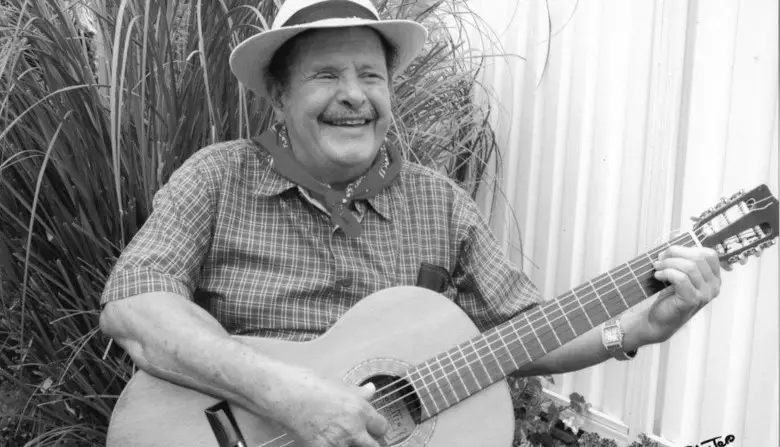
His contribution was officially recognized in 1996 when he was named a member of the Costa Rican Popular Culture Gallery by the Ministry of Culture, Youth, and Sports. This honor, reserved for the most outstanding exponents of national traditions, solidified his place as one of the most important figures in Costa Rican folklore. But his recognition was not limited to the national sphere; his music led him to be appointed as a cultural ambassador for Costa Rica on several occasions, representing the country at international events in the United States, Colombia, Ecuador, and Panama. Through these tours, Lencho not only shared the richness of Costa Rican culture with global audiences but also strengthened national identity and pride in the country’s folk traditions.
Throughout his career, Lencho recorded a series of albums that became references of Costa Rican folklore. His works include titles such as “¡Idiay….Lencho!,” “¿Quiubo Lencho?”, “¡Adentro Lencho!”, and “Costa Rica mía,” among others. In these works, Lencho not only showed his skill as a musician but also his ability to handle various instruments, such as the guitar, mandolin, accordion, and organ. Each of these albums contributed to the preservation of Costa Rica’s cultural heritage, allowing future generations to have access to an essential part of their cultural identity.
In addition to his prolific discography, Lencho received several awards and recognitions throughout his life. In 2001, he was awarded the “Reca” Mora Prize by the Association of Composers and Musical Authors of Costa Rica (ACAM), which highlighted his tireless dedication to artistic work and his invaluable contribution to the country’s folk music. His legacy lives on in the memories and hearts of all those who enjoy his music, and his impact on Costa Rican culture is unquestionable, as his songs continue to be performed, listened to, and celebrated throughout the country.
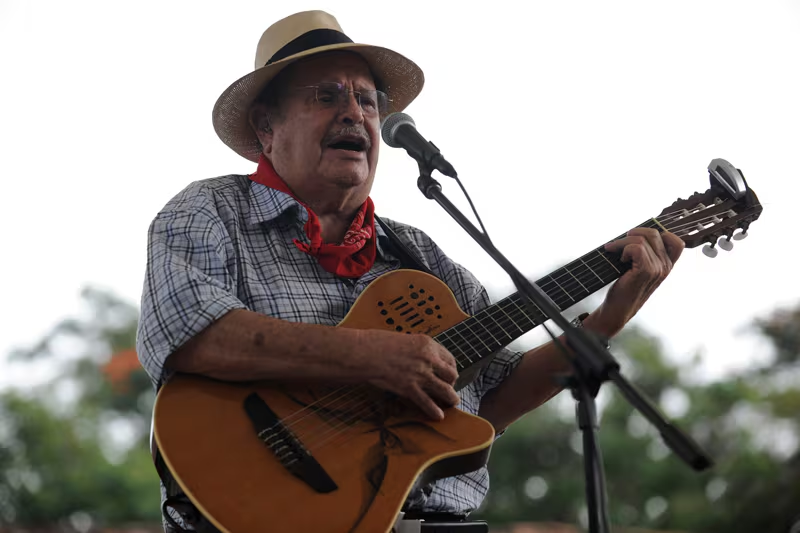
Teaching Career
In addition to his career as a musician and folklorist, Lencho Salazar also left a significant mark on the field of music education in Costa Rica. In the mid-1960s, during the administration of Education Minister Guillermo Malavassi (1966-1970), Lencho graduated as a music teacher, thus beginning his teaching career. His first position was at the Conservatorio de Castella, an institution recognized for its focus on the artistic training of young Costa Rican talent. Here, Lencho shared his passion and knowledge with new generations, inspiring them to explore and preserve the country’s musical folklore.
Following the retirement of renowned violinist José Aurelio Castillo Jiménez in 1999, Lencho assumed his position at the Escuela Normal Superior de Heredia, under the direction of Francisco Quesada. In this role, he continued his educational work, influencing many students with his practical approach and his love for traditional Costa Rican music. During this time, Lencho not only dedicated himself to teaching but also to integrating folk music into the educational curriculum, helping young people develop an appreciation for their cultural heritage from a young age.
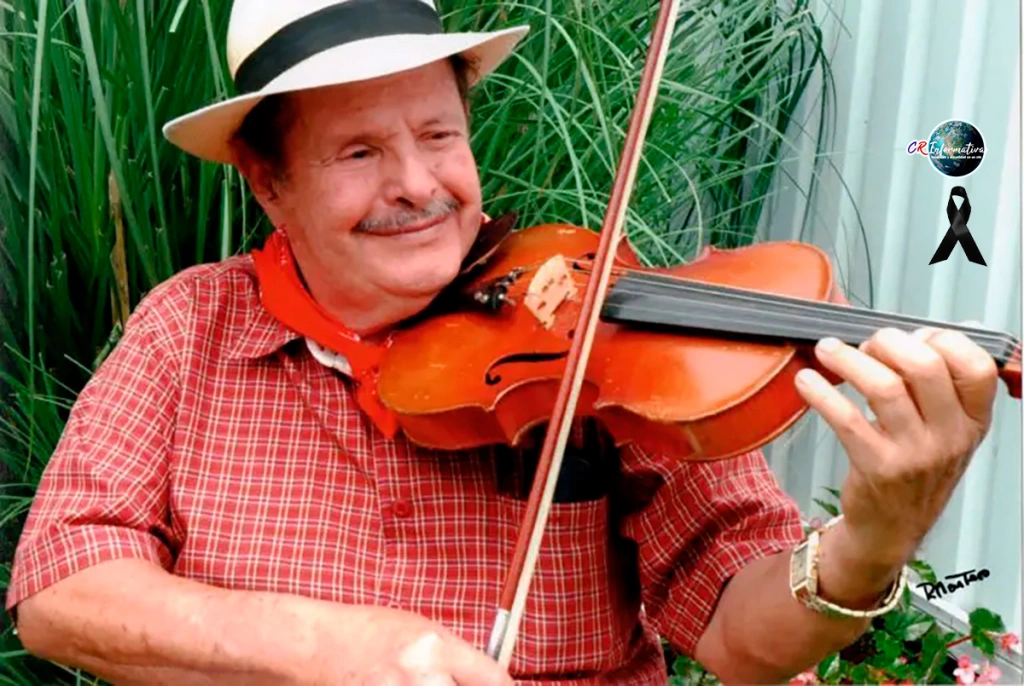
Finally, Lencho retired as a professor at the National University of Costa Rica, Omar Dengo Campus in Heredia, and at the Conservatorio de Castella. His teaching career was as fruitful as his artistic work, leaving a legacy that transcended his music and extended to the training of new musicians and artists. The combination of his work as an educator and musician allowed him not only to promote Costa Rican folklore but also to ensure that it continued to be valued and appreciated by future generations. His commitment to education was a reflection of his desire to keep Costa Rican popular culture alive and to ensure that his love of music was passed on to those who came after him.
Last years and death.
In the last years of his life, Lorenzo “Lencho” Salazar experienced a decline in his health due to his advanced age. During the last decade, he suffered from various health complications, including mini-strokes and blood pressure problems, which forced him to significantly reduce his artistic activity. Despite these challenges, Lencho continued to be a beloved and respected figure within the Costa Rican community, with a legacy that continued to grow even as his health deteriorated.
On August 28, 2024, Lencho Salazar passed away at the age of 92 in his home in Naranjo, Alajuela, surrounded by his family. The news of his death was confirmed by his son, José Manuel Salazar, who shared the loss of his father with a mixture of sadness and gratitude for a life dedicated to art and Costa Rican popular culture. According to his family, Lencho died peacefully in his sleep, after having spent the last years in palliative care due to his fragile health.
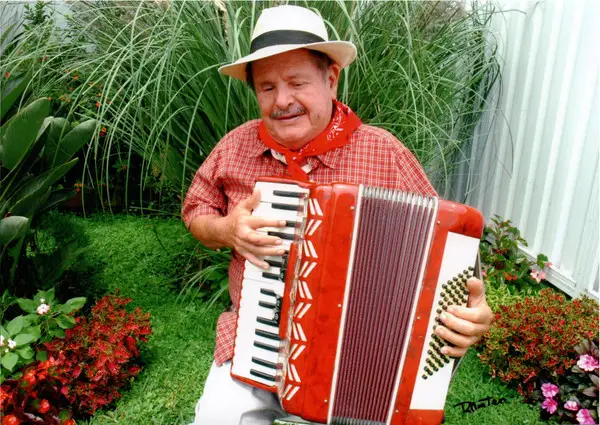
The departure of Lencho sparked a wave of condolence messages and support from various personalities and the general public. His legacy as a musician, folklorist, and educator was widely recognized, and many Costa Ricans expressed their gratitude for his contribution to the country’s cultural heritage. Although his physical presence is no longer with us, his spirit lives on in the countless songs he created and in the hearts of those who were touched by his music and his message of love for Costa Rican culture.
Posthumous tributes were not long in coming; friends, family, colleagues, and followers of his work gathered to celebrate his life in a special mass at the Catholic church of San Roque de Naranjo, the community where he was born and where he wished to be buried. His legacy continues to live on, reminding us of the importance of our cultural roots and the power of music to unite people across time and space.
Lorenzo “Lencho” Salazar was undoubtedly a fundamental figure in the history of Costa Rican folk music. His ability to capture the legends, stories, and humor of the people through his humorous folk songs established him as a cultural icon. Throughout his life, Lencho not only enriched the country’s musical culture with his talent as a musician and composer but also played a vital role as an educator, transmitting his passion for Costa Rican folklore to new generations.
Lencho Salazar lived with an unwavering devotion to his art and his country, uniting people through his music and preserving the essence of Costa Rican traditions in every note and every song. His legacy is a testament to the power of music to keep cultural roots alive and strengthen the identity of a people. Today, through his countless compositions and the affection he garnered in life, his memory lives on, inspiring musicians, educators, and lovers of culture to value and protect Costa Rica’s folk heritage.
This article celebrates the life and work of Lencho Salazar, a man whose dedication to art and culture transcended borders, leaving an indelible mark on the history of Costa Rica. May his example of passion, creativity, and love for our own continue to illuminate the path of those who seek, like him, to express the beauty and authenticity of the Costa Rican sou







